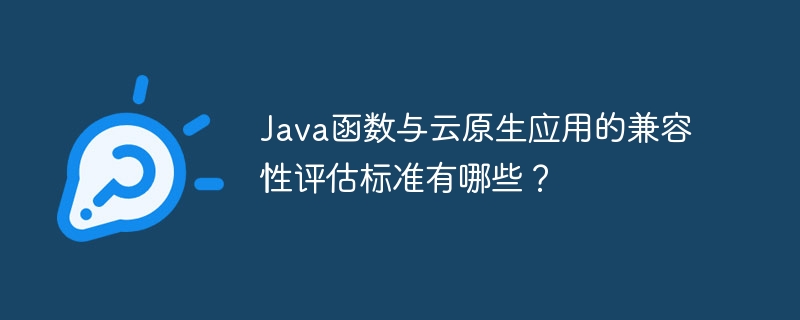Home >Java >javaTutorial >What are the compatibility evaluation criteria for Java functions and cloud native applications?
What are the compatibility evaluation criteria for Java functions and cloud native applications?
- WBOYWBOYWBOYWBOYWBOYWBOYWBOYWBOYWBOYWBOYWBOYWBOYWBOriginal
- 2024-04-20 18:06:011160browse
Java Functions and Cloud Native Application Compatibility Standards: Serverless Support: No servers or infrastructure to manage to run your code. Lightweight and responsive: Start and handle requests quickly. Scalability: Automatically scale up to meet peaks in demand and scale down when demand decreases. Event-driven: Subscribe to and respond to events, trigger operations or processes. Distributed system awareness: Aware of distributed systems, such as cluster management and service discovery.

Compatibility evaluation criteria between Java functions and cloud native applications
Cloud native applications have become the core of modern software development practices. And Java functions play a crucial role in this. To ensure compatibility of Java functions with cloud-native environments, the following standards are critical:
1. Serverless support
Cloud-native applications rely on serverless architecture. This means there is no need to manage servers or infrastructure to run your code. Java functions should support serverless platforms such as AWS Lambda, Azure Functions, and Google Cloud Functions.
2. Lightweight and responsive
Java functions should be lightweight and responsive to meet the requirements of cloud-native applications. They should start up and handle requests quickly to avoid delays or bottlenecks.
3. Scalability
Cloud-native applications need to be able to elastically scale to handle changing workloads. Java functions should be able to automatically scale up to meet peak demand and scale down when demand decreases.
4. Event-driven
Cloud native applications are highly dependent on event-driven architecture. Java functions should be able to subscribe to and respond to events, triggering specific operations or processes.
5. Distributed system awareness
Cloud native applications are usually deployed in distributed environments. Java functions should be distributed system aware, such as cluster management, service discovery, and load balancing.
Practical Example: Evaluating the Compatibility of Java Functions on AWS Lambda
To demonstrate the evaluation criteria, let us consider running a Java function using AWS Lambda. The following steps outline the compatibility assessment process:
- Verify serverless support: Confirm that the Java function is compatible with the AWS Lambda serverless platform.
- Measure response time: Deploy the function and measure the response time from call to completion.
- Test scalability: Simulate workload peaks and check whether the function can automatically expand.
- Verify event subscriptions: Subscribe a Lambda function to handle AWS events to ensure the function can receive and respond to events.
- Integrate distributed services: Use AWS SDK to integrate Lambda functions with other AWS services to verify distributed system awareness.
Evaluating the compatibility of Java functions according to these standards can ensure that they are seamlessly integrated with cloud-native applications and take full advantage of cloud computing.
The above is the detailed content of What are the compatibility evaluation criteria for Java functions and cloud native applications?. For more information, please follow other related articles on the PHP Chinese website!
Related articles
See more- Build cloud-native applications from scratch using Docker and Spring Boot
- Easily release potential and popularize cloud native and artificial intelligence through Qingyun Cloud
- Java Kubernetes and Java: Understand the deployment and management of cloud native applications in one article
- Java supports Kubernetes: the fast lane towards cloud-native applications
- Spring Cloud Alibaba: In the cloud native era, the rise of domestic cloud computing tools

